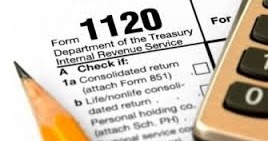What’s Your Accountant Doing for Your Company? – Top 10 Questions to Discuss With the Up Coming Sept. 15th Tax Filing Deadline
September 15th is the time of the year that US corporate tax payers rush to get the final numbers to their accountants for the filing deadline (assuming they extended the returns with the automatic 6 month extension – IRS form 7004). It’s similar to the stress of April 15th individual tax filing deadlines. In many cases owners never fully analyze and disseminate the information from the corporate P&L and the corresponding tax return.
The common statement I receive from new clients all the time, “I really don’t get numbers and that’s why I have an accountant so they can handle it all.” It’s a significant error not understanding the financial statements and the corresponding tax return. You don’t need to be an expert but understanding how things flow and more importantly how you have done compared to the previous year is critical for future adjustments to your business.

If you have extended your corporation tax return filing to Sept. 15th, consider the following review items with your accountant:
Top 10 Things to Ask Your Accountant
1. There is a disconnect between the corporate books and adjusting all the components for the tax return, ask why?
2. Are the QuickBooks entries are correct? They must be reviewed and balanced. “Garbage in Garbage out” happens all the time with QuickBooks.
3. Analyze the P&L and tax returns to fully understand what effect keeping excess inventory at year-end has on the bottom line, corporate purchases for the year, and of course understanding depreciation.
4. Coordinate a “Non-Rush just file the Return” meeting with your accountant. This meeting must review a comparison of current year vs. previous 2 years P&L and tax returns to evaluate what’s working or not from a financial perspective. Ask your accountant to prepare a comparison on one page, as it’s imperative to evaluating the financial trend in the business.
5. Analyze expense areas that are generalized inside of QB – many will just enter components) what actually makes up the number of office expenses, get a detail summary. Ask the following: Why is advertising expense significantly lower, what was the reason that travel and expense is significantly higher, did the conference you attended help spur increased sales, etc.
6. Analyze the key areas of the “best use” of reinvested capital back to the company. Where did the money go or more importantly in the event of a book and/or tax loss for the year, what happened in terms of income, expenses, acquisition, accounts receivables outstanding that resulted in the loss.
7. Payroll Expense is normally one of the highest costs for any company. Without great people the business will not grow and scale up. Look at the payroll expense number and review the salaries/bonuses per employee to ensure you have the best in class team or make adjustments.
8. Ask your accountant for a written summary of how they view your business beyond just the numbers – This is a qualitative summary not just quantitative.
9. If you are considering selling your business in the future, it’s important to know how the financial statements (Balance sheet and multiple years of P&L’s) impact the valuation. Ask your accountant to provide you with base line ratio’s per your industry of the 3 ways to measure the worth of the business:
a. Asset Approach
b. Market Approach
c. Income Approach
10. Ask your accountant what value are they bring to you vs. just receiving the QuickBooks files and preparing and filing the tax returns.

If you are not reviewing more than just the financials in detail with your accountant and just signing your tax returns this week, consider evaluating a new partnership with a new accounting firm. Please feel free to email me at wkurtz@carrassociates.com with any questions, need ideas and interested in an objective financial review of your business situation.

